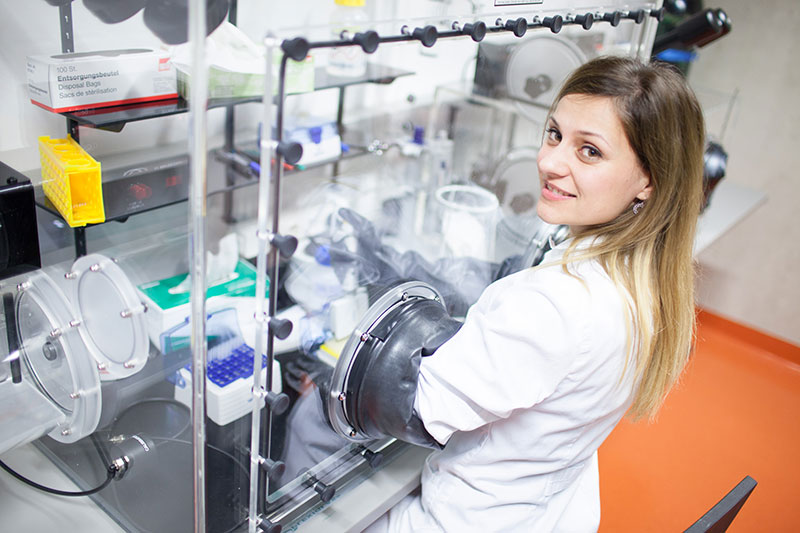In conversation with Martina Schweiger
The researcher at the Institute of Molecular Biosciences explains in an interview when research with animals helps.
In addition to the legal requirements, Austria's universities and non-university research stations have jointly defined their commitment to responsible animal experimentation in research and teaching. How is this reflected in everyday research? Martina Schweiger, a researcher at the Institute for Molecular Biosciences, explains her approach in an interview. In her scientific work, she gets to the bottom of cachexia, among other things. This is the inexorable loss of body weight that accompanies cancer.

Why is research with animals unavoidable? Martina Schweiger: The disease patterns we are working on are systemic diseases, such as diabetes. This means that not one cell type, not one organ, but the entire organism is affected. To get to the bottom of these diseases and find new or improved therapeutic approaches, we also have to look at and research the entire body. In fact, many diseases involve miscommunication between cells and organs. To do this, it is necessary to understand how they interact in an organism. Since these mechanisms are related in mice and humans, research with animals helps us all enormously.
Which diseases do you research help with these findings? Schweiger: We are researching the mechanisms and treatment of cancer-induced cachexia - a secondary disease that causes massive weight loss. This systemic disease is directly responsible for 20 percent of deaths in cancer patients. Indirectly for many more, because cancer therapy often cannot be continued in cachectic patients. Understanding the mechanisms of the disease and finding a treatment is only possible with the model organism.
And when are animal experiments obsolete? Schweiger: Once we have found a possible mechanism, we can investigate the molecular details behind it in cell culture. Then animal experiments are not necessary. We are constantly developing cell culture to get as close as possible to the situation in the organism. We are working more and more frequently with so-called organ cultures, in which we reproduce organs in a three-dimensional cell culture using different cell types. These also develop vascular systems themselves and can reproduce the complexity. In this way, we can study the interplay of different cells in an organ - without animal testing.
How are animal experiments regulated? Schweiger: The experiments must be well justified and their unavoidability presented. It is extremely important that animal experiments are not carried out indiscriminately. Regulation and also control by the Federal Ministry of Education, Science and Research is therefore essential.
What do you understand by responsible research with animals? Schweiger: A responsible animal experiment must meet several criteria: It must be based on a hypothesis that has already been strengthened with alternative methods. It must, of course, be planned precisely so that you don't find out afterwards that you should have done it differently after all. We make sure that the experiment is carried out and observed carefully and only by trained personnel. An animal experiment must be terminated in good time to prevent pain and suffering. And, of course, the research must be properly evaluated and documented. For every single animal experiment, we apply the so-called 3R rule: Replace (avoid), Reduce (reduce) and Refine (improve).
Can you understand people who are very critical of this research? Schweiger: No one should conduct animal experiments without having the necessary awareness and sensitivity. The welfare of animals is also close to my heart. We are trained to recognize and treat pain. I would like to say to animal-loving people, we are not researching the side effects of cosmetics, we are researching deadly diseases for which there is no cure yet. A drug that has been researched and manufactured using animal testing can save lives.